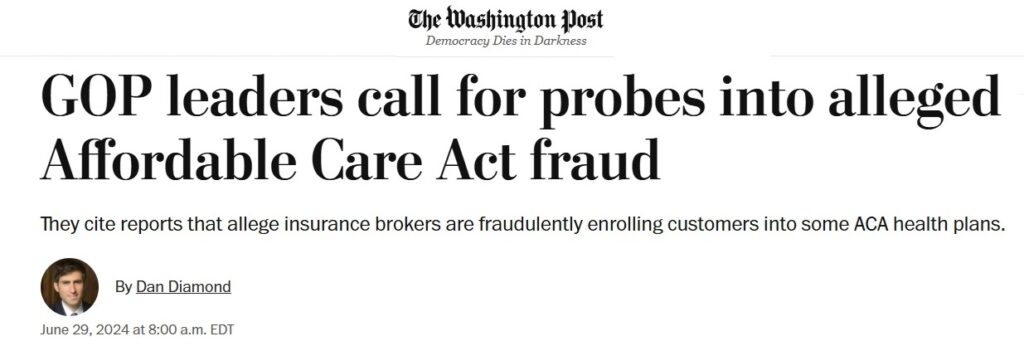The Paragon Health Institute released a report that concludes there is acute fraud from Florida residents misrepresenting their income to benefit from the Obamacare (Affordable Care Act) health insurance subsidies. The report titled The Great Obamacare Enrollment Fraud was released in June 2024 and has congressional Republicans calling for an investigation.

Deep Red States Accused of Fraud
The criminal accusations of fraud are leveled within the executive summary of the report.
“In nine states (Alabama, Florida, Georgia, Mississippi, North Carolina, South Carolina, Tennessee, Texas, and Utah), the number of sign-ups reporting income between 100 percent and 150 percent FPL exceed the number of potential enrollees. The problem is particularly acute in Florida, where we estimate there are four times as many enrollees reporting income in that range as meet legal requirements.”
The attack by Paragon is focused on individuals reporting their income below 150 percent of the federal poverty level (FPL) in order to have the subsidy cover the full cost of the health plan. Paragon is correct that there are limitations to the repayment of the excess subsidies IF the final household income is below 400 percent FPL. In other words, if your income is higher than you estimated, you may not need to repay all the excess subsidies if the income is under 400 percent FPL. That can be a big chunk of change for some families. If the final income is over 400 percent FPL, ALL excess Premium Tax Credit subsidies must be repaid.
Paragon compared estimated income supplied the marketplace exchanges (Healthcare.gov and state-based exchanges like Covered California) against 2022 U.S. Census Bureau. They then assumed the U.S. Census Bureau income numbers were accurate for 2024, and then concluded a lot of people were lying about their income and committing fraud.
Paragon focused on core red Republican states.
LARGE-SCALE EXCHANGE ENROLLMENT FRAUD
“In nine states, more people signed up for coverage than would be eligible, meaning that the number of people who enrolled in a plan with zero premium and very low cost-sharing plans exceeded the number of eligible adults in that income range. Seven of these nine states did not expand their Medicaid programs—an indication that a large part of the issue is people in non-Medicaid expansion states overestimating their income in order to qualify for fully subsidized, low cost-sharing plans. This outcome is expected considering people with incomes between 100 percent and 138 percent FPL in the 100 percent to 150 percent FPL range do not legally qualify for APTCs in expansion states. Florida is a clear outlier, enrolling more than four times as many people in this income category as we estimate are eligible. Georgia, Mississippi, and South Carolina enrolled more than twice as many people in this income category as estimated eligible. Texas enrolled nearly twice as many people in this income category as estimated eligible.”
As is correctly stated, the states with potentially over inflated incomes are in states who refused to expand Medicaid. This illustrates how desperate people are, even in conservative states, for health insurance. Even though the report is flawed and biased, there is no denying Paragon has correctly identified states whose residents are looking for affordable health insurance.
It is apparent from the tone of the report that the authors do not like the Affordable Care Act. Instead of recommending tighter income verification for consumers who enroll in health plans with generous subsidies with low incomes, Paragon recommends letting the expanded Premium Tax Credit subsidies expire in 2025.
In addition, Paragon did not engage in a discussion of the Modified Adjusted Gross Income (MAGI) that is used to determine eligibility for the Premium Tax Credit Subsidies. The MAGI includes Social Security retirement and disability benefits which do not show up as taxable income that may be recorded at the U.S. Census Bureau. Census data may show a tranche of people ineligible for the ACA, but when Social Security is added, many people are eligible for the Premium Tax Credit subsidies.
Fraud is a strong word. I’m surprised that Paragon assumed that the bulk of consumers in certain states were deliberately over or underestimating their income to receive the health insurance subsidies. Regardless of whether Florida residents are purposefully misstating their incomes, it is an estimate that is allowed under the ACA. Large corporations play the same IRS rule game with various reporting methods and loopholes, but no one is accusing them of fraud.
Insurance Agents Perpetrating Massive Fraud Alleged
Paragon expanded their attack on Healthcare.gov by asserting that health insurance agents were also committing massive fraud.
“Some private brokers are likely making the problem of fraudulent enrollment worse. These entities have contracts with insurers, and these contracts require the insurers pay them a commission for each enrollee. Some brokers have come under increased scrutiny the past few months for changing the agent of record to capture other agents’ commissions, enrolling people without their knowledge, and canceling exchange enrollee coverage and re-enrolling people in different plans to earn higher commissions. (Footnote 41)”
Footnote 41 is to a Kaiser Family Foundation (KFF) report on complaints of agents switching the health plans of enrolled consumers. The KFF story noted, “Agents whose clients have been affected say the switches ramped up last year and are continuing into 2024, although quantifying the problem continues to be difficult.” Verifying the complaints or sales allegations is time consuming. A consumer may have been switched into another health plan because their previous health plan left the market.
There is no quantifiable data on how large or widespread the problem is. However, Paragon took the quote, with no concrete data, and drew a conclusion that agents are engaged in massive fraud.

The Paragon report has congressional Republicans all excited as reported by the Washington Post. Congressional Republicans are claiming that insurance agents are committing an astonishing level fraud by fraudulently enrolling millions of Americans into the Affordable Care Act who are not eligible for the Advance Premium Tax Credit subsidies for health insurance. The allegation of massive fraud by insurance agents was reported by the Washington Post on June 29, 2024. The congressional Republicans are calling for an investigation by the Government Accountability Office and the inspector general at the Department of Health and Human Services.
https://www.washingtonpost.com/health/2024/06/29/aca-fraudulent-enrollment-congress-investiation
As a health insurance agent, certified to enroll individuals and families into subsidized ACA health plans, I can tell you compensation for fraudulently enrolling a family is too low compared to the risks of losing my insurance license for committing fraud. The Republicans are also accusing agents of surreptitiously changing the health plan of the enrolled member for financial gain. Again, that is a ridiculous accusation based on the low commission rates and almost certain consumer allegations against the agent.
I have no doubt there is some fraud on the part of both insurance agents and consumers. However, the reconciliation of the Premium Tax Credits on the consumer’s federal tax return severely limit any financial gain on the part of the consumer. As for agents, I know several agents who have just stopped ACA enrollments because of the time it takes, and the low commission levels compared to selling home and auto insurance.
These fraud allegations seemed to be promoted by a conservative organization who is obviously unfamiliar with the way the ACA works.
“The allegations center on a report from the Paragon Health Institute, a conservative think tank, which concluded that as many as 5 million Americans may be wrongly receiving ACA insurance subsidies. The Paragon report compared census estimates on the number of Americans potentially eligible for such subsidies against the level of ACA enrollment.” – Washington Post
When you enroll in a health plan through a marketplace exchange like Covered California, you are asked to estimate your income for the year. I’ve worked with many families whose household incomes were over $100,000, but because of a job loss or change in family circumstances, their estimated income may be half of the previously filed federal tax return.
If you were able to assemble some tax return data, it may look like people are receiving too much subsidies based on previous income tax numbers. But you are asked to estimate – guess – at your future income, which may be substantially lower than the previous year. Consequently, some people see fraud when they just don’t understand how the ACA works regarding the income estimate.
The incorrect assumption is that insurance agents are coaching the consumers to estimate their income low to get larger subsidies. That backfires on the consumer because if their income is much higher when they do their taxes, they must repay all the excess Premium Tax Credit subsidy. If fraud is perpetrated by the insurance agent, the IRS catches it.
What is the motivation of an insurance agent to commit ACA enrollment fraud? From my book of business in California, averaging all the health plans I represent, the average commission is approximately $18 per person per month. That is $216 per year for an individual enrollment. I am not risking my insurance license for $216 per year.
For some agents who don’t represent all the health plans, and thereby receive a commission for the enrollment, there can be some incentive to switch a consumer’s health plan. But this makes little sense. If a consumer is offered three health plans, but the agent is only appointed with one of them, some unscrupulous agents will attempt to steer the consumer into the health plan that will pay them a commission.
I know of no agent who would switch a consumer’s health plan after enrollment. That only invites a sales allegation and potentially losing accreditation to sell ACA health plans or even losing the insurance license. All that risk for $216 per year? Even the greediest of agents would not take that risk.
I suspect the consumer allegations regarding having the health plans changed was not rooted in a nefarious plan by an insurance agent. The higher probability is that the health plan the consumer was enrolled into dropped out of the marketplace and they had to be moved to another health plan. For example, Oscar Health dropped out of the California individual and family market for 2024. If a consumer was not proactive in selecting a new plan, a different plan was selected for them by Covered California.
There was a couple who called me who had lost the Oscar health plan. They were enrolled in a different plan they did not like. They did not pay the premium. The health plan was terminated. Four months later they needed health insurance. Unfortunately, the couple did not have a Qualifying Life Event for Special Enrollment Period to enroll in health insurance.
This is where the greatest possibility for fraud occurs. There may be a misrepresentation of a Qualifying Life Event for the Special Enrollment Period to gain health insurance and the subsidies. The incentive for the agent is a paltry $216 commission for an individual. Conversely, the consumer incentive may be thousands of dollars if the diagnosis calls for extensive and costly health care services, like cancer treatment.
In other words, the consumer has more incentive to commit fraud than the insurance agent. This sort of fraud is limited to enrollment outside of the Open Enrollment Period. During open enrollment anyone can enroll in health insurance and receive the subsidies, no questions asked. I’ve talked to many consumers who want to jump into real health insurance in the middle of the year when they learn that the Health Care Sharing Ministry they enrolled into is not covering their health care costs.
Fraud takes knowledge and intent. You need the knowledge of the rules and the intent to circumvent those rules for financial gain. The Affordable Care Act is full of rules that most people have never heard of. Generally, going through the application process limits erroneous enrollments and subsidies.
Let’s take the couple who have a household income of $200,000. They do not qualify for subsidies. One spouse earns $175,000 and the other spouse earns $25,000. The spouse with the lower income, if they were single, would qualify for the health insurance subsidies. They decide to file their taxes separately so the spouse with the lower income can gain subsidized health insurance.
They go through the ACA online application and mark they are married filing separately. They submit the application that returns an ineligibility result. Why? If you are married, you must agree to file your federal tax return as Married Filing Joint. If you mark filing Married Filing Separate, you are ineligible for the Premium Tax Credit subsidies.
If the married couple indicated that the lower income spouse was single and that person received the subsidies, with full knowledge of the rules and intent to ignore the rules, that would be fraud. The incentive for the couple may be $5,000 or $10,000 in subsidies. But why would an agent aid such a scheme for $216 in commission and the possibility of losing their insurance license?
I suspect there is a certain percentage of enrolled households receiving the ACA health insurance subsidies that are not entitled to them. Every year, thousands of people get huge IRS tax bills for the repayment of excess Premium Tax Credit subsidies. The error usually occurs with the estimation of their income. There is usually income that must be added into the Modified Adjusted Gross Income (MAGI) estimate that the consumer or agent was not aware of.
One example is a couple where one spouse starts receiving Social Security retirement benefits. While Social Security is not taxable in most situations, it is counted in the MAGI. The couple never informs their agent because they did not think it is part of their taxable income for the subsidies. There is no fraud, it is just complicated rules and lack of communication.
As an agent for the ACA health plans, I’m supposed to be an expert not only for health insurance but IRS tax rules. I was asked the other day if required minimum distributions from an inherited IRA are counted as income. After an hour of research, I came up with conflicting answers. If I give the wrong answer, it was not with fraudulent intent, I’m just not a tax expert. Covered California tells agents NOT to give tax advice, but they won’t give tax information, and you can’t talk to anyone at the IRS.
The Paragon Health Institute report on fraud in the ACA enrollments is flawed and biased. The report does highlight the desperate need for affordable health insurance in many states that have not expanded Medicaid. As opposed to trying to learn the income situation and circumstances of consumers who may have misrepresented their incomes, Paragon just label all of them fraudsters. That assertion alone erases any credibility the report may have had.


